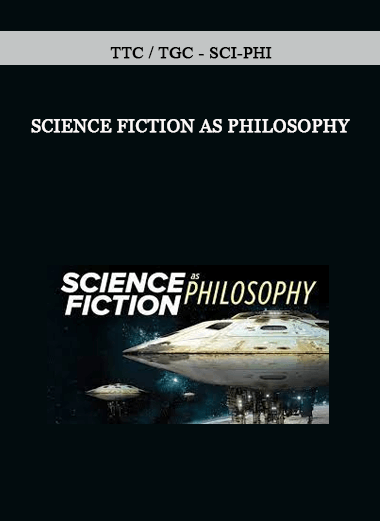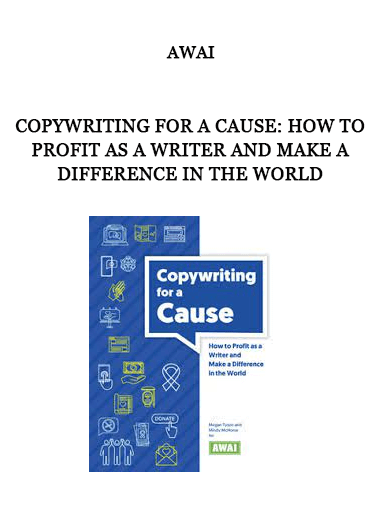Courses Infomation
TTC / TGC – Sci-Phi – Science Fiction as Philosophy
TTC / TGC – Sci-Phi – Science Fiction as Philosophy
**More information:
Description
Filesize : 8.34 GB
The science fiction genre has become increasingly influential in mainstream popular culture, evolving into one of the most engaging storytelling tools we use to think about technology and consider the shape of the future. Along the way, it has also become one of the major lenses we use to explore important philosophical questions.
Hide Full Description
The origins of science fiction are most often thought to trace to Mary Shelley’s novel Frankenstein, a story born from a night of spooky tale-telling by the fireside that explores scientific, moral, and ethical questions that were of great concern in the 19th century—and that continue to resonate today. And, although novels and short stories built the foundations of science fiction, film and television have emerged as equally powerful, experimental, and enjoyable ways to experience the genre. Even as far back as the silent era, films like Fritz Lang’s Metropolis have used science fiction to tell stories that explore many facets of human experience.
In Sci-Phi: Science Fiction as Philosophy, Professor of Philosophy David Kyle Johnson of King’s College takes you on a 24-lecture exploration of the final frontiers of philosophy across several decades of science fiction in film and television. From big-budget blockbusters to television series featuring aliens in rubber masks, Professor Johnson finds food for philosophical thought in a wide range of stories. By looking at serious questions through astonishing tales and astounding technologies, you will see how science fiction allows us to consider immense, vital—and sometimes controversial—ideas with a rare combination of engagement and critical distance.
The Future Is Now
Science fiction is often concerned with the future, being used not only as a tool of prediction—humans are notoriously bad at accurately predicting the future—but also as one of extrapolation and interrogation. Rather than simply asking what the future will look like, the futuristic visions of sci-fi TV, like Star Trek, Firefly, and even the animated comedy Futurama, offer compelling statements about humanity’s hopes, dreams, and fears. We can, therefore, use fictionalized futures to better understand today’s world.
Setting a story in the future—or in an alternate reality, or on a faraway planet—also allows sci-fi creators to open up the realm of possibility beyond what our current world offers, while also looking at very real scientific possibilities. As you look at sci-fi films like Arrival and Interstellar, Professor Johnson highlights the kinds of issues worth considering if contact with extraterrestrial life or time travel became part of our real-life experience. And even if these experiences remain in the realm of fiction, considering them still provides insight into important philosophical questions. Indeed, throughout the lectures of Sci-Phi, you will ponder many questions that have concerned philosophers for centuries, including:
Do humans truly have free will?
Could machines one day be conscious? Or be sentient?
Could we actually be living in a simulated world?
How will humanity confront a future of diminished resources and advancing technology?
Are science and religion compatible?
When, if ever, is war justified?
How do we know what information to trust and what to dismiss?
Exploring Reality through Fiction
Staples of science fiction like time travel, alternate universes, and extraterrestrial life are endlessly fascinating ideas to explore. Yet, despite the insights they can give us, they may not seem very relevant to everyday life. Even our conception of reality—what is real and what isn’t—can have little bearing on the more mundane aspects of living from day to day. But science fiction, for all its futurism and outlandish flourishes, is not limited to these theoretical concepts; it is also a window into crucial discussions about the here and now, questions concerning ethics, power, religion, tolerance, social justice, politics, and the many practical dimensions of living in a world that is constantly changing and forever presenting humans with fresh new dilemmas to solve. And by removing us from reality, sci-fi can also remove our biases and make us see such issues anew.
Indeed, as Professor Johnson makes clear, stories of simulated worlds and artificial intelligence can seem far-fetched, but they actually offer valuable insights into social and ethical issues that may be more immediate and relevant than they first appear. By looking at them through fiction, we can take a step back and get a clearer picture of the larger implications. For instance, by looking at characters like Commander Data in Star Trek: The Next Generation or the Cylons in Battlestar Galactica, we are forced to wonder: If we create artificial intelligence that achieves true sentience, how will we treat these man-made beings? Will we repeat the sins of the past by enslaving them or will we embrace them as our equals? If we are ever able to re-create a convincing version of the world via computers, as films like The Matrix and The Thirteenth Floor suggest, do the lives lived in those simulations mean less than those in the “real” world? The answers to these questions—and many others—speak volumes about human values and, given our ever-evolving technology, may require answers sooner rather than later.
You may be surprised to see how often a science fiction story can “trick” you into thinking about questions and concepts you may have never considered. Shows like The Twilight Zone and Black Mirror overtly present questions and issues for audiences to ponder. However, while other films and television shows may seem to focus more on the adventure and entertainment value of science fiction, they still often have deep philosophical dimensions. Consider the long-running British TV series Doctor Who. A beloved icon of science fiction, the show has always been framed as simply the exciting weekly adventures of a time-traveling alien; yet, throughout its decades on television, it has explored issues of autonomy, sentience, pacifism, colonialism, racism, grief, morality, and much more.
A Unique View of Philosophy
While each lecture of Sci-Phi focuses on a few key films or television episodes, you will also explore dozens of other movies and TV episodes along the way. Likewise, each philosophical concept you explore opens the door to further discovery. Throughout the lectures, you will be introduced to the ideas of great thinkers like Descartes, Hobbes, Locke, Marx, Nietzsche, Sartre, Turing, Baudrillard, and many others; and through these ideas, you will better understand the different ways philosophy examines the big questions, from metaphysics and epistemology to existentialism and ethics.
Fans of the genre will find their experience of sci-fi stories enriched by layers of philosophical inquiry that reveal each story to be much more than just entertainment. Similarly, those who are looking for a thrilling and accessible introduction to philosophy will be equally rewarded by Professor Johnson’s breadth of knowledge, as well as his deep and abiding love for both science fiction storytelling and philosophical exploration. As you engage with philosophy by way of sci-fi stories for screens both large and small, it is important to keep in mind that Professor Johnson will not shy away from revealing key plot points in many of the stories he explores throughout the lectures; so, although it is not required, watching the films and TV episodes at the heart of each lecture is recommended. Presented as a one-on-one conversation and enlivened by fun visual references to many of the stories you will encounter, Sci-Phi: Science Fiction as Philosophy is a philosophy course unlike any other.
Whether telling stories of far-flung futures or investigating the here and now, science fiction is an invaluable source of intellectual and imaginative exploration. From the genre-defining classics like Star Wars, Doctor Who, 2001: A Space Odyssey, and The Twilight Zone to a new wave of speculative tales like Transcendence, Snowpiercer, Westworld, and The Hunger Games, sci-fi stories offer a uniquely engaging and incisive way to ask serious questions about the world we live in, even when those stories are set in a galaxy far, far away. Philosophy is the search for truth. Sometimes that truth is best revealed through fiction.
What is HYPNOSIS – NLP?
Neuro-linguistic programming (NLP) is a technique used to provide clients with the tools to overcome certain life obstacles. NLP is in short, a way of helping people help themselves to reach a state of excellence, happiness and peace of mind.
NLP is a learning model devised by two American academics (Dr Richard Bandler and John Grinder) in the early 70s, who were fascinated by the relationship between language behaviour and excellence. They believed that by analysing the unconscious linguistic techniques used by successful people, they could produce ‘a recipe for excellence’ in which other people could consciously learn to apply said ‘successful techniques’.
What is NLP?
NLP stands for neuro-linguistic programming.
Neuro – All of our experience is gained from the neurological processes that govern our five senses: taste, touch, smell, sight and sound.
Linguistic – We make sense of these experiences through a set of filters, including language. The language we use can also affect the way we experience things.
Programming – This is a way of controlling the outcome of something. A person can use NLP to ‘predetermine excellence’ by adjusting the language we use.
To break it down, the science aspect is the process of extracting and learning the techniques. The art aspect is the act of applying the techniques to our own lives.
There are four ways NLP techniques are most commonly used:
to teach effective communication
to ensure continual personal development
to enhance learning
to encourage a greater enjoyment in life
NLP is used to teach us how changing our perception of the world can lead us to adjust and adapt our behaviours to live the life we want.
NLP and hypnotherapy
Hypnotherapists aim to induce a relaxed and receptive state (trance) in their clients in order to access the subconscious. Many of the obstacles that prohibit or limit a person’s experiences are deeply embedded in the subconscious, so by accessing the thought processes that usually remain hidden, hypnotherapists can work with clients to change the restrictive thought pattern and make room for positive development.
An NLP practitioner will look at your attitude, your language and how you use it, your understanding of relationships and your ability to build rapport, as well as the physical and emotional states that are best for accomplishing a task. Effective communication and perception of others and ourselves, will also be key focuses. All of these will be analysed and examined by the professional, so that a strategy for improving understanding, motivation, learning and memory can be formed.
Many hypnotherapists train in NLP to help improve their ability to communicate more effectively with their clients, as well as to help their clients communicate more effectively with themselves.
Salepage : TTC / TGC – Sci-Phi – Science Fiction as Philosophy












![Peter Titus - Create Your Own Automated Stock Trading Robot In EXCEL! [39 Video (MP4) + 2 Document (HTML)]](https://crablib.info/wp-content/uploads/2021/02/Peter-Titus-Create-Your-Own-Automated-Stock-Trading-Robot-In-EXCEL-39-Video-MP4-2-Document-HTML.jpg)



















Reviews
There are no reviews yet.